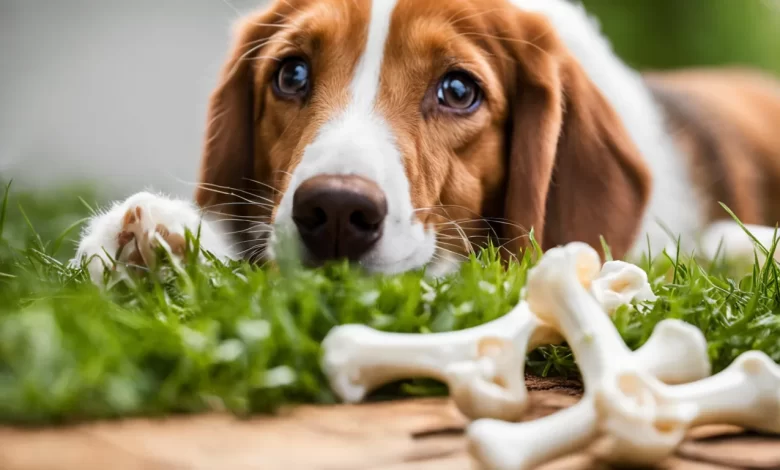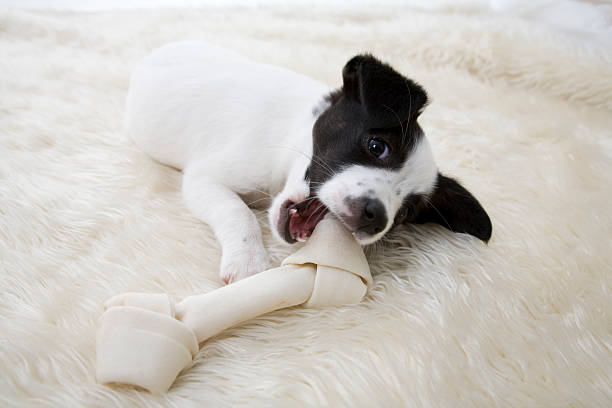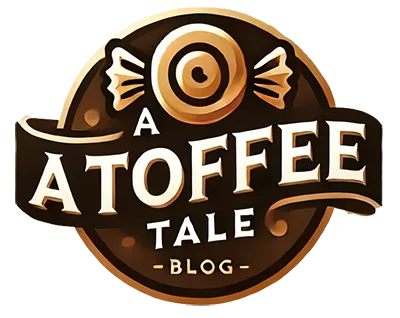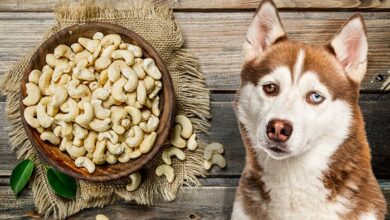Can Dogs Eat Rabbit Bones? What Every Pet Owner Should Consider in 2024

Can Dogs Eat Rabbit Bones? Understanding the basics is crucial when considering rabbit bones for your dog. These bones are smaller and more fragile than those from larger animals, which can impact their safety.
They do provide natural nutrients like calcium and phosphorus, which are beneficial for your dog’s health. However, not all dogs are suited for rabbit bones, particularly aggressive chewers. It’s important to consider your dog’s chewing habits before offering these bones.So let’s explore that- can dogs eat rabbit bones?
The Risks Associated with Feeding Rabbit Bones
When considering whether to give your dog rabbit bones, it’s crucial to understand the potential risks. Asking, “Can Dogs Eat Rabbit Bones?” naturally leads to weighing the dangers that could impact your dog’s health.

Small Bones Can Splinter Easily
- Choking Hazard: Small rabbit bones can splinter, creating sharp fragments that may cause choking. This risk is especially high for smaller dogs or those that tend to gulp their food.
- Internal Injuries: Splintered bones can lead to severe internal injuries, such as puncturing the digestive tract, which can be life-threatening.
Cooked Rabbit Bones Are Particularly Dangerous
- Brittleness: Cooking makes rabbit bones brittle and more likely to break into sharp pieces. These brittle fragments can cause severe damage if ingested.
- Increased Risk of Splintering: Unlike raw bones, cooked bones are more prone to splintering, making them a much greater hazard for your dog.
Potential for Gastrointestinal Blockages
- Swallowing Without Proper Chewing: If your dog swallows large pieces of bone without thoroughly chewing them, there’s a risk of gastrointestinal blockages. This can lead to severe complications, requiring immediate veterinary attention.
- Digestive Obstructions: Bones that aren’t fully digested can create blockages in the intestines, leading to discomfort, pain, or even requiring surgical intervention.
While rabbit bones may seem like a natural treat for dogs, the risks—especially the dangers of splintering, choking, and gastrointestinal blockages—cannot be overlooked. When considering “Can Dogs Eat Rabbit Bones?” it’s essential to be fully aware of these potential hazards and explore safer alternatives to keep your dog healthy and safe.
Benefits of Rabbit Bones: Why Some Dog Owners Choose Them
When deciding what treats to give your dog, you might wonder, “Can Dogs Eat Rabbit Bones?” Despite the potential risks, some dog owners choose rabbit bones for the unique benefits they offer.
Dental Health Benefits
- Teeth Cleaning: Chewing on rabbit bones can help clean your dog’s teeth naturally. The act of gnawing scrapes away plaque, which can reduce the risk of dental issues like tartar buildup and gum disease.
- Fresher Breath: By reducing plaque and keeping teeth clean, rabbit bones may also contribute to fresher breath, making those doggy kisses a bit more pleasant.
Mental Stimulation
- Satisfying Natural Chewing Instincts: Dogs have a natural urge to chew, and rabbit bones provide an excellent outlet for this behavior. Chewing is not only enjoyable for dogs but also offers mental stimulation, helping to relieve boredom and reduce anxiety.
- Stress Relief: For dogs that experience stress or anxiety, chewing on rabbit bones can be a calming activity, helping them to relax and feel more at ease.
Nutritional Value
- Essential Nutrients: Raw rabbit bones are rich in nutrients like calcium and phosphorus, which are vital for maintaining strong bones and overall health. These minerals contribute to healthy bone development, particularly in growing dogs.
- Natural Source of Nutrition: Rabbit bones provide a natural source of nutrition that can complement your dog’s diet, especially if you’re feeding them a raw or home-prepared diet.
While there are potential risks associated with feeding rabbit bones, many dog owners choose them for their dental benefits, mental stimulation, and nutritional value. When considering “Can Dogs Eat Rabbit Bones?” it’s important to weigh these benefits against the risks to make the best decision for your dog’s health and well-being.
Raw vs. Cooked Rabbit Bones: What’s the Difference? Can Dogs Eat Rabbit Bones
If you’re considering adding rabbit bones to your dog’s diet, understanding the difference between raw and cooked bones is crucial for your pet’s safety. The question often arises: “Can Dogs Eat Rabbit Bones?” Let’s explore the key distinctions between raw and cooked rabbit bones to help you make an informed decision.
Raw Rabbit Bones: Softer and Safer
- Lower Risk of Splintering: Raw rabbit bones are naturally softer, which means they are less likely to splinter when your dog chews on them. This reduces the risk of sharp fragments breaking off and causing internal injuries.
- Nutritional Benefits: Raw bones retain their natural nutrients, such as calcium and phosphorus, which are beneficial for your dog’s overall health. These nutrients contribute to stronger bones and teeth.
- Safer Chewing Experience: Because raw bones are more flexible, they provide a safer chewing experience, especially for dogs that love to gnaw. However, it’s still important to supervise your dog while they chew to prevent any potential issues.
Cooked Rabbit Bones: Brittle and Risky
- Higher Risk of Splintering: Cooked rabbit bones become brittle during the cooking process, making them more prone to splintering. These sharp splinters can easily cause choking or puncture your dog’s digestive tract, leading to serious injuries.
- Loss of Nutrients: Cooking rabbit bones can strip them of essential nutrients, making them less beneficial for your dog. This can also make the bones harder and more difficult for your dog to chew safely.
- Increased Injury Risk: The brittleness of cooked bones increases the risk of your dog breaking a tooth or swallowing a sharp piece, which could lead to gastrointestinal blockages or other health complications.
When considering “Can Dogs Eat Rabbit Bones?” it’s essential to choose raw over cooked. Raw rabbit bones are generally safer, as they are softer and less likely to splinter. However, it’s crucial to always supervise your dog while they chew, regardless of the type of bone, to ensure a safe and enjoyable experience.
How to Safely Introduce Rabbit Bones into Your Dog’s Diet
Introducing rabbit bones into your dog’s diet can be beneficial, but it’s essential to do so with care. If you’re wondering, “Can Dogs Eat Rabbit Bones?” the answer is yes, but with proper precautions. Here’s how you can safely incorporate rabbit bones into your dog’s routine.
Start Small: Assess Your Dog’s Tolerance
- Begin with Small, Raw Rabbit Bones: When introducing rabbit bones for the first time, start with smaller bones to see how your dog reacts. This will help you gauge their chewing style and digestive tolerance.
- Monitor Their Chewing Habits: Pay close attention to how your dog handles the bone. If they chew too aggressively or try to swallow large pieces, it might be best to remove the bone and try a different approach.
Timing Is Key: Offer After a Meal
- Reduce Aggressive Chewing: To prevent your dog from chewing too aggressively, offer the rabbit bone after they’ve had a meal. A full stomach will make them less likely to rush through the bone, reducing the risk of choking or swallowing large pieces.
- Encourage Gentle Chewing: When your dog is not extremely hungry, they are more likely to chew the bone slowly, which is safer and more beneficial for their dental health.
Bone Quality Matters: Fresh and Clean
- Ensure Freshness: Always provide your dog with fresh rabbit bones. Old or spoiled bones can harbor bacteria that may be harmful to your pet.
- Avoid Seasoning and Additives: Make sure the bones are free from any seasoning, spices, or additives. These can upset your dog’s stomach or cause other health issues. Stick to plain, natural bones to keep your dog safe.
When it comes to the question, “Can Dogs Eat Rabbit Bones?” the key is to introduce them safely. Start with small, raw bones, offer them after a meal, and ensure the bones are fresh and unseasoned. By following these steps, you can help your dog enjoy the benefits of rabbit bones without the risks.
Alternatives to Rabbit Bones for Safe Chewing
While rabbit bones can be a natural option for your dog, they come with risks that might make you consider safer alternatives. If you’re asking, “Can Dogs Eat Rabbit Bones?” but are concerned about the potential dangers, there are other options to explore that can satisfy your dog’s chewing needs without compromising their safety.
Safer Chewing Options: Dental Chews, Bully Sticks, and Synthetic Bones
- Dental Chews: These are specifically designed to promote oral health by reducing plaque and tartar buildup. Dental chews are made to be safer for your dog to chew, minimizing the risk of choking or digestive issues.
- Bully Sticks: A popular choice among dog owners, bully sticks are made from high-protein beef muscle. They are easily digestible and provide a long-lasting chew that satisfies your dog’s natural urge to chew without the dangers associated with bones.
- Synthetic Bones: These durable, long-lasting chew toys are designed to mimic the experience of chewing on bones but without the splintering risks. Synthetic bones come in various flavors and textures, making them an appealing and safe alternative.
Commercially Prepared Raw Bones: A Safer Choice
- Raw Bones Designed for Dogs: If you prefer to stick with bones, opt for commercially prepared raw bones that are specifically designed for dogs. These bones are carefully processed to minimize the risk of splintering and are often larger, making them less likely to cause choking or blockages.
- Safety and Quality Control: Commercially prepared bones undergo strict safety and quality controls, ensuring they are free from harmful bacteria and are appropriately sized for your dog’s breed and chewing habits.
Consult Your Veterinarian: Tailored Recommendations
- Personalized Advice: Every dog is different, and what works for one may not be suitable for another. Your veterinarian can provide personalized advice on the best chewing options based on your dog’s age, breed, and overall health.
- Preventative Care: By discussing safe chewing alternatives with your vet, you can prevent potential health issues related to chewing bones, such as dental fractures or gastrointestinal blockages.
Conclusion
When considering alternatives to rabbit bones, it’s important to choose safe and suitable options for your dog. Dental chews, bully sticks, synthetic bones, and commercially prepared raw bones designed specifically for dogs are excellent alternatives. Always consult your veterinarian to ensure you’re making the best choice for your dog’s health and safety.




